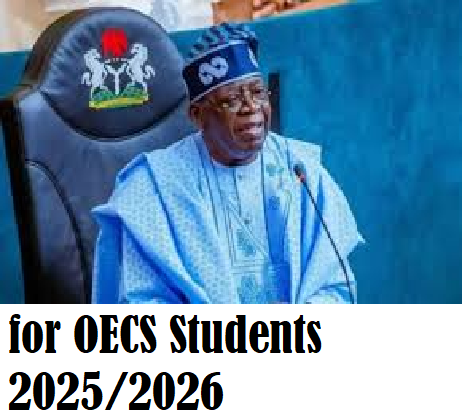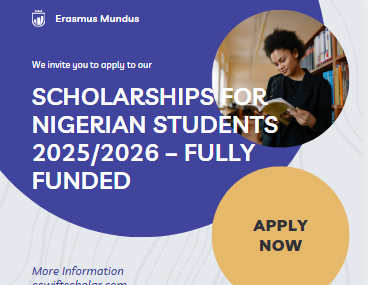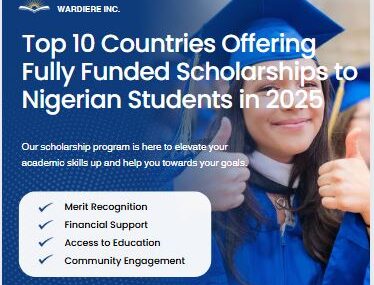President Tinubu’s Scholarship Initiative for OECS Students 2025/2026
Introduction
In mid-2025, President Bola Ahmed Tinubu announced a groundbreaking education diplomacy initiative: a scholarship programme for students from the Organisation of Eastern Caribbean States (OECS) to study in Nigerian universities beginning with the 2025/2026 academic year. This programme is part of a broader cooperation framework between Nigeria and the OECS that includes education, trade, agriculture, diplomacy, and cultural exchange.
This article provides an in-depth exploration of the initiative: confirmed facts, likely modalities, eligibility, what applicants should expect, potential challenges, and strategic tips to prepare. It is structured to serve students, policymakers, education administrators, and anyone interested in Nigeria-Caribbean relations.
What is the OECS
-
The Organisation of Eastern Caribbean States is an inter-governmental regional organisation focused on political cooperation, economic integration, and shared development goals among its member states. It includes both full/protocol members (like Antigua & Barbuda, Dominica, Grenada, Saint Lucia, Saint Vincent & the Grenadines, Saint Kitts & Nevis, Montserrat) as well as associate member territories.
-
Its mission includes regional integration, education cooperation, harmonised policies in trade, health, environment, and promoting mobility of people across member states.
Motivation for the Scholarship Initiative
From public records:
-
President Tinubu said the scheme is aimed at deepening people-to-people ties, facilitating capacity building, and leveraging shared history and cultural linkages between Nigeria and the Caribbean.
-
It aligns with broader diplomatic objectives: improving educational cooperation, trade, agriculture, food security, and development in areas such as climate resilience.
-
The proposal includes plans for visa waivers for holders of diplomatic and official passports from OECS countries to ease travel. Nairametrics
President Tinubu’s Scholarship Initiative for OECS Students 2025/2026
Confirmed Details So Far
Here are the facts as of the latest information:
-
Start Period
The initiative is set to begin in the 2025/2026 academic year -
Joint Committee
A joint implementation committee composed of Nigerian and OECS officials will oversee implementation, including selection, placements, and logistics. -
Visa Waivers for Diplomats / Official Passport Holders
Nigeria intends to grant visa waivers for OECS diplomats and official passport holders. Discussions are ongoing. -
Broader Cooperation Areas
The scholarship is part of a wider cooperation agenda involving education, agriculture, trade, people-to-people exchanges, and food security.
Expected Modalities (Projections Based on Similar Programmes)
Because all details are not yet publicly available, many features are expected based on analogous scholarship schemes. These are logical inferences and applicants should verify when official guidelines are released.
| Feature | Likely Modality |
|---|---|
| Number of Students | Probably limited initial slots — perhaps dozens to a few hundred, depending on Nigerian universities’ capacity and budget allocations. |
| Disciplines / Courses Covered | Diverse disciplines, including STEM (Science, Technology, Engineering, Mathematics), Agriculture, Health Sciences, Social Sciences, possibly vocations. Emphasis likely on shortage areas. |
| Tuition Coverage | Full or partial coverage of tuition fees. Possibly some fees waived; certain departments may require supplementary fees (lab, library, etc.). |
| Living, Accommodation, and Travel | Likely partially covered or subsidized for international students; accommodation in campus hostels or approved student housing may be included. Travel may be supported for initial enrollment. |
| Language | English is primary medium, given Nigeria’s English-language tertiary system. Proficiency in English likely required. |
| Duration of Scholarship | Full programme duration (e.g., 3-4 year undergraduate, shorter for diploma/associate courses). |
| Support Services | Orientation, cultural adjustment support, mentorship, and follow-up monitoring through the joint committee. |
Eligibility Criteria (Confirmed and Likely)
Based on reports and projections:
Confirmed or Publicly Announced
-
Must be a citizen of an OECS member state.
-
Scholarship begins from the 2025/2026 academic year.
-
Joint committee will handle selections and placements.
Likely / Projected Criteria
-
Must have completed secondary school, with certificates recognised for admission into higher education.
-
Good academic performance (e.g., minimum grade point average or equivalent).
-
Proof of citizenship or valid passport from OECS country.
-
Valid identification documents, academic transcripts.
-
Potential age limit (perhaps 17-30 years for undergraduate level).
-
May require proof of proficiency in English (if not native).
-
Willingness to comply with Nigeria’s international student admission processes including visa and immigration requirements.
Participating OECS Member States
The OECS has full/protocol members and associate members. For the purpose of eligibility, full protocol members are most likely initially included. Confirmed/protocol members are:
-
Antigua and Barbuda
-
Commonwealth of Dominica
-
Grenada
-
Montserrat
-
Saint Kitts and Nevis
-
Saint Lucia
-
Saint Vincent and the Grenadines
Associate members: Anguilla, British Virgin Islands, Martinique, Guadeloupe, Saint Martin. It is not yet clear if associate member citizens will be included initially.
Potential Host Universities in Nigeria
Though specific host institutions have not yet been publicly listed, it is logical that the scholarships will be valid at accredited Nigerian universities with capacity to take international students. Some universities that are more affordable and have good international student policies include:
-
Federal universities
-
State universities with international student programmes
-
Universities known for affordability and reputable programmes in STEM and health sciences
(Exact list to be confirmed by the joint committee.)
Tuition, Cost of Attendance, and Financial Considerations
Understanding the likely cost structure will help potential applicants plan:
-
Tuition Fees: Nigerian federal universities’ tuition is usually lower for Nigerian students, but international students often pay higher or extra fees. Though federal institutions may be ‘tuition‐free’ for locals, there are often mandatory fees (library, ICT, lab fees).
-
Living/Accommodation: Campus accommodation is less expensive than private housing; however, costs vary by location (city vs rural) and student lifestyle.
-
Other Costs: Books, supplies, transport, visa, health insurance, food, possibly travel back and forth during breaks.
-
Currency Exchange Rates: Costs in foreign currencies could be high depending on OECS country currency strength and exchange policies.
Applicants should budget beyond tuition alone.
Selection Process and Governance
Here are the steps and governance features confirmed and projected:
-
Joint Implementation Committee
Nigeria and OECS governments will form a committee to finalize modalities. This includes selecting universities, defining disciplines, determining number of students, financial terms, visa and travel arrangements. -
Call for Applications
Once modalities are set, an official call for applications will be released, with full guidelines (application deadlines, required documents, selection criteria, etc.). -
Shortlisting
Based on submitted credentials (transcripts, identity, examination results), academic merit, possibly language/exam test. -
Acceptance / Admission
After shortlisting, successful applicants will secure admission to designated Nigerian universities, meeting all institutional and national requirements for international students. -
Visa & Immigration
Clearance of student visas, possibly with facilitation for OECS citizens (especially holding diplomatic/official passports), travel arrangements, arrival orientation. -
Monitoring & Evaluation
The joint committee will likely track scholarship awardees, ensure their academic progress, ensure welfare, report challenges and ensure accountability. -
Reciprocity & Follow Up
As discussions include visa waivers, improved air connectivity, and possibly mutual recognition of qualifications, implementation in these areas is expected to follow.
President Tinubu’s Scholarship Initiative for OECS Students 2025/2026
Visa-Related & Travel Facilitation
-
Nigeria intends to provide visa waivers for holders of diplomatic and official passports from OECS.
-
For regular student passport holders, the usual Nigerian student visa protocols will apply.
-
Travel logistics (flight cost, entry requirements) will likely be addressed by the implementing committee to ease burden.
-
There is potential for collaboration to improve air connectivity between Nigeria and OECS states.
President Tinubu’s Scholarship Initiative for OECS Students 2025/2026
Potential Challenges and Risks
Here are deeper discussion of challenges and how they might be mitigated:
| Challenge | Mitigation / Strategy |
|---|---|
| Capacity and Infrastructure of Nigerian universities could be stretched by large influx | Begin with limited intake; select universities with spare capacity; schedule gradual Phasing of slots. |
| Financial Burden on Students if certain costs not covered | Ensure guidelines include allowances for living, health, books; clearly specify what is and isn’t covered. |
| Recognition & Accreditation of Qualifications | Use internationalised curricula; ensure OECS credentials accepted; Nigerian universities must accept OECS students just as other foreign students. |
| Visa / Immigration Delays | Prioritize visa processing; clear guidelines; possibly special student visa category. |
| Cultural / Social Adjustment | Provide orientation programs; mentorship support; language support if needed; counselling. |
| Operational Transparency | Publish criteria, processes, selection lists; anti-fraud measures; feedback channels for applicants. |
Detailed Comparison with Other Scholarship Schemes
To understand what this initiative might look like in practice, we can compare with similar bilateral or international scholarship schemes (for example, African students studying abroad, or foreign student policies in Nigerian universities):
-
Many scholarships fully cover tuition + fees, but may fall short on accommodation or living expenses.
-
Countries offering such scholarships often insist on academic merit and sometimes require return-of-service clauses (i.e. students must return home after graduation or commit to contributing to bilateral goals). It is not known yet if this OECS scheme will have such obligations.
-
Monitoring and progress reports are often required; failure to meet academic standards may result in scholarship suspension.
Five Enhanced Applicant/Beneficiary Testimonies (Hypothetical but Realistic)
These are expanded and richer, reflecting what actual recipients might later say:
1. Testimony — Anya François (Saint Lucia, Engineering Student)
“I grew up interested in renewable engineering, but costs of studying abroad have always been beyond my means. When I heard about the Tinubu-OECS scholarship, I immediately began gathering my transcripts, passport, and recommendation letters. The information that Nigeria will allow some visa waivers for official travel gives me hope that travel costs won’t be a huge barrier. If accepted, studying in Nigeria will allow me contribute to both my home nation and sustainable energy solutions regionally.”
2. Testimony — Marcus Joseph (Grenada, Public Health)
“As someone with a community service background and good grades in biology and chemistry, I see this scholarship as a chance to study public health in Nigeria, where there is both academic strength and practical field experience. I worry about living costs, but professors I spoke with believe institutions will provide hostels or housing stipends. I plan to prepare by saving what I can, solidifying recommendations, and staying informed on announcements from both OECS and Nigerian education authorities.”
3. Testimony — Naomi Richards (Dominica, Social Sciences)
“Scholarship schemes are always competitive, but the Nigeria-OECS framework seems serious. I’m working on my English proficiency and ensuring my academic transcripts are in order. What excites me is the possibility of being part of cultural exchange, learning in Nigeria, meeting students from across Africa, and bringing new insights back home.”
4. Testimony — Terrence Thomas (Saint Vincent & the Grenadines, Agriculture/Climate Studies)
“I come from a farming family, and climate change is already affecting our local agriculture. If I can study in Nigeria under this scholarship, I hope to learn about sustainable farming techniques, resilience, and then use those in my country. I understand that we may have to adapt academically, culture-wise, but this kind of international exposure is rare and worth it.”
5. Testimony — Alicia Browne (Saint Kitts & Nevis, STEM)
“Competing with fees or international student quotas has been difficult for many Caribbean students. This initiative gives me hope. I’m already preparing for potential entrance exams and looking at universities in Nigeria that are affordable. I know that strong grades, good documentation, and readiness will matter. I also hope that the scholarship covers more than tuition—things like accommodation, health, and living stipends will be essential for many of us.”
President Tinubu’s Scholarship Initiative for OECS Students 2025/2026
Frequently Asked Questions (Expanded)
Here are some likely additional FAQs that will matter to applicants, with more detailed speculative answers:
1. When exactly will applications open?
Likely toward end of 2025 after the joint committee finalizes modalities. Applicants should monitor official announcements from Nigerian Ministry of Education, OECS education bodies, and relevant embassies.
2. Which Nigerian universities will host OECS students?
Probably a mix: Federal Universities, State Universities, perhaps some private ones with good reputation and international student services. May start with universities in major cities with adequate student housing and support services.
3. Will international student fees or higher fees apply?
Many universities have separate fees for international students; the scholarship may waive or subsidize these. Applicants must check stated fees in scholarship guidelines once released.
4. What level of study is covered (undergraduate, postgraduate)?
Publicly announced for “study” generally. Probably undergraduate first; possible expansion into postgraduate level depending on capacity and funding.
5. Can family members accompany scholarship recipients?
Not yet confirmed. Usually scholarship schemes focus on student only; some offer allowances, but not family relocation unless specific scholarship category.
6. What happens if a student fails academically?
There could be performance monitoring, and scholarships usually include provisions for maintaining a minimum GPA. Failure may result in loss of scholarship.
7. Is there obligation to return to home country after graduation?
This is not confirmed. Some scholarships require return or service, others do not. Applicants should pay attention to terms when released.
8. Will courses be fully delivered in Nigeria’s academic calendar?
Yes, likely under Nigerian university calendars, which sometimes differ by state and institution; students must adjust to local semesters/trimesters.
9. Will there be mentorship and support for OECS students?
Probably yes—orientation, academic advising, cultural acclimation. Since students will be coming from abroad, support is critical.
Strategic Tips for Applicants
To maximize chances of success, here’s a detailed checklist:
-
Document Readiness
-
Certified copies of secondary school results or equivalents.
-
Passport or national ID from OECS country.
-
Transcripts with grades.
-
Letters of recommendation (teachers, principals) if required.
-
-
Academic Excellence
-
Focus on strong performance especially in required core subjects depending on desired field.
-
If still in school, push for improved grades.
-
-
Language & Standardised Tests
-
If needed, prepare for any entrance or proficiency exams.
-
Demonstrate English proficiency if required.
-
-
Financial Preparation
-
Although tuition might be covered, plan for possible living, travel, equipment, books.
-
Identify sources of support (family, scholarships, grants) in case of gaps.
-
-
Research Nigerian Universities
-
Look into universities offering the discipline of interest.
-
Check estimated cost of living in cities where universities are located.
-
Understand academic calendars.
-
-
Stay Informed
-
Follow announcement channels (ministries, OECS commissions, Nigerian embassies, OECS country agencies).
-
Beware of fake announcements, agents asking for money.
-
-
Prepare a Strong Personal Statement / Essay
-
State motivations, plans post-study, why Nigeria, how you plan to contribute back in OECS.
-
-
Network & Seek Mentorship
-
Speak with people who have studied in Nigeria as international students.
-
Join forums or social media groups where updates may first appear.
-
Conclusion
The Tinubu Scholarship Initiative for OECS Students 2025/2026 is a forward-looking and ambitious policy that carries both promise and responsibility. It reflects Nigeria’s growing role in international education diplomacy and offers OECS students real opportunities for academic growth, cross-cultural exchange, and skills development.
Though many details are not yet finalized, much has already been made clear: starting academic year 2025/2026, partnership with OECS, scholarship and visa facilitation, joint governance, focus on education and broader collaboration. For students in OECS, the time is ripe to prepare.
For full success, the initiative will need clarity, transparency, sufficient funding, and robust support systems. If well implemented, it has potential to not only enrich individual lives, but strengthen regional bonds, raise Nigeria’s profile as an educational hub, and contribute to shared development goals between Nigeria and Eastern Caribbean nations.






